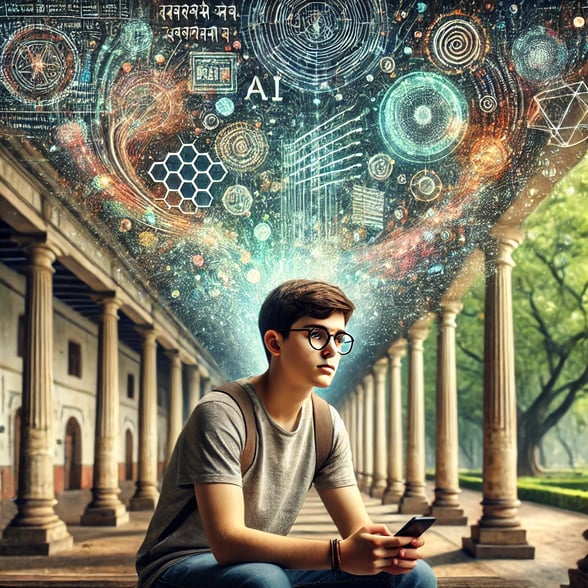From Rote to Reason: How AI is Reshaping the Epistemic Culture of Indian Education.
This article explores how AI—particularly tools like ChatGPT—is reshaping India’s education system, shifting from a legacy of rote memorization to a culture of inquiry, creativity, and critical thinking. It examines the collapse of institutional hierarchies, the role of AI in democratizing access for marginalized students, and the urgent need for curriculum reform, mentorship, and ethical pedagogy in the AI era.
INTERDICIPLINARY AI ETHICS EDUCATION
Dr. Shary Krishna
6/28/20253 min read
The Legacy of Rote Learning in India
For decades, the Indian education system has operated under a regime of rote memorization, a pedagogical legacy rooted partly in colonial frameworks designed to produce clerks, not thinkers. The system rewarded obedience, repetition, and conformity over curiosity, critical reasoning, or interdisciplinary exploration. As scholars like Krishna Kumar and institutional reports like ASER and NIEPA have long highlighted, even foundational learning levels show severe conceptual gaps, and questioning students are often marginalized rather than mentored.
This entrenched culture of rote learning has historically devalued those students who possess imaginative or inquisitive minds but lack the ability—or interest—to memorize and reproduce abstract facts for examinations. The educational trajectory, from school to professional success, was largely determined by performance in standardized entrance tests, sustained coaching, and rigid curricular silos.
The AI Disruption: Toward Epistemic Democratization
With the public release of tools like ChatGPT after 2022, a silent but profound epistemic transformation has begun. For the first time, students—regardless of institutional affiliation, caste background, or location—can access high-quality knowledge interfaces. These tools do not merely answer questions; they listen without judgment, respond instantaneously, and allow for recursive dialogue.
The cultural consequence of this shift is significant: AI has decentered the authority of the teacher and the institution, making space for the rise of the self-taught learner. Students no longer need to suppress questions out of fear of teacher ridicule or institutional inertia. Instead, they can prompt, explore, and iterate their way into conceptual understanding, often far beyond what their curriculum formally offers.
Collapse of Tiered Institutional Hierarchies
India's educational landscape has been historically stratified into tier-1, tier-2, and tier-3 colleges, often accessible according to class privilege, geographic location, and caste-based opportunities. A student in a tier-3 college with limited faculty support could rarely compete with a coaching-centre-trained student in an elite institution.
AI disrupts this stratification. Now, epistemic agency is partly independent of institutional branding. The ability to critically engage with AI—particularly through skilled prompting—can allow students from under-resourced settings to leapfrog traditional hierarchies. It repositions the key determinant of educational advancement not as access to coaching but as the ability to ask intelligent, meaningful questions.
A Shift from Exam-Centric Learning to Inquiry-Based Epistemology
However, the danger persists: many students, conditioned by decades of exam-centricity, continue to use AI merely to pass exams or generate assignments. Without a deep cultural shift in educational values, AI risks becoming just another shortcut, not a catalyst for transformation.
To mitigate this, curricular reform must align with this new epistemic ecology. Exams must evolve to test for reasoning, not recollection. AI literacy—particularly the ethics of prompting, recognition of bias, and critical reflexivity—must become part of general education.
Global South, Local Struggles: AI as an Epistemic Equalizer?
India, like much of the Global South, has suffered from educational corruption, infrastructural failure, and pedagogical neglect. Even in government colleges, many students find themselves trapped in systems where faculty appointments are marred by political or caste-based nepotism, not academic merit. In this context, AI offers a compensatory scaffolding, especially for students from backward classes and lower-middle-income backgrounds.
Yet, access remains uneven. The digital divide—marked by disparities in internet speed, device quality, and English literacy—continues to restrict the full democratizing potential of AI. Moreover, AI’s training datasets are still predominantly Western, raising concerns about cultural relevance and epistemic erasure of indigenous knowledge systems.
Mentorship, MOOCS, and the Future of Distributed Education
AI alone cannot solve the problem of human mentorship. Students—especially those unaccustomed to self-directed learning—require guidance to ask better questions, evaluate answers, and build conceptual scaffolding. India must consider scaling mentorship through MOOCs, hybrid models, and AI-human co-teaching platforms, especially in underfunded public institutions.
The Psychological Residue of Rote Learning
Students conditioned for years to memorize and regurgitate may find themselves paralyzed when asked to think independently. AI cannot resolve this alone. Unless school-level education is restructured to prioritize critical thinking, creativity, and ethical questioning, even the best AI will serve as a crutch, not a ladder.
UGC’s Policies: A Multidisciplinary Evolution
The recent strides by Indian regulatory bodies like the UGC, alongside initiatives such as MERU, mark a pivotal and positive shift towards fostering cross-disciplinary fluidity in education. By embracing policies that allow students to pursue multiple degrees and diverse academic interests, these reforms are actively nurturing the intellectual cross-pollination essential for innovation. This flexibility empowers students—from engineers contributing to medical humanities to homeopathy scholars exploring AI ethics—to bridge traditional academic silos. Such revolutionary policies, promoting more fluid hopping across different disciplinary boundaries, are crucial for advancing transdisciplinary research. This approach is vital for developing comprehensive systems solutions powered by AI to address complex global existential problems, ensuring that ethical considerations are woven into the fabric of technological advancement.
Policy reform must reflect the complex, nonlinear learning journeys that AI now makes possible. Without such reform, institutional structures will remain incompatible with the epistemic fluidity AI enables.
Conclusion: A New Cognitive Justice Horizon
AI is not a revolution in itself. It is a mirror and a multiplier—reflecting the biases of its users, amplifying their questions, and offering a simulacrum of mentorship. But in the hands of India's truth-seeking, question-asking, justice-demanding students, it may become a generational emancipator.
The transition from rote to revelation is neither automatic nor universal. It demands:
Infrastructure,
Epistemic humility,
Ethical pedagogy,
AI literacy,
and curriculum reform.
But for those once silenced in classrooms, AI now whispers: “Ask anything.” And that, in itself, is a revolution.
From Rote to Reason: How AI is Reshaping the Epistemic Culture of Indian Education.




Comment section










